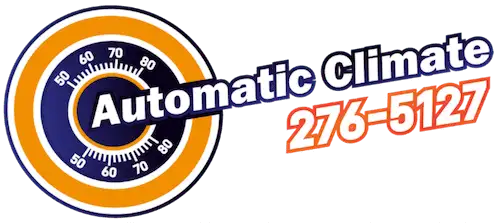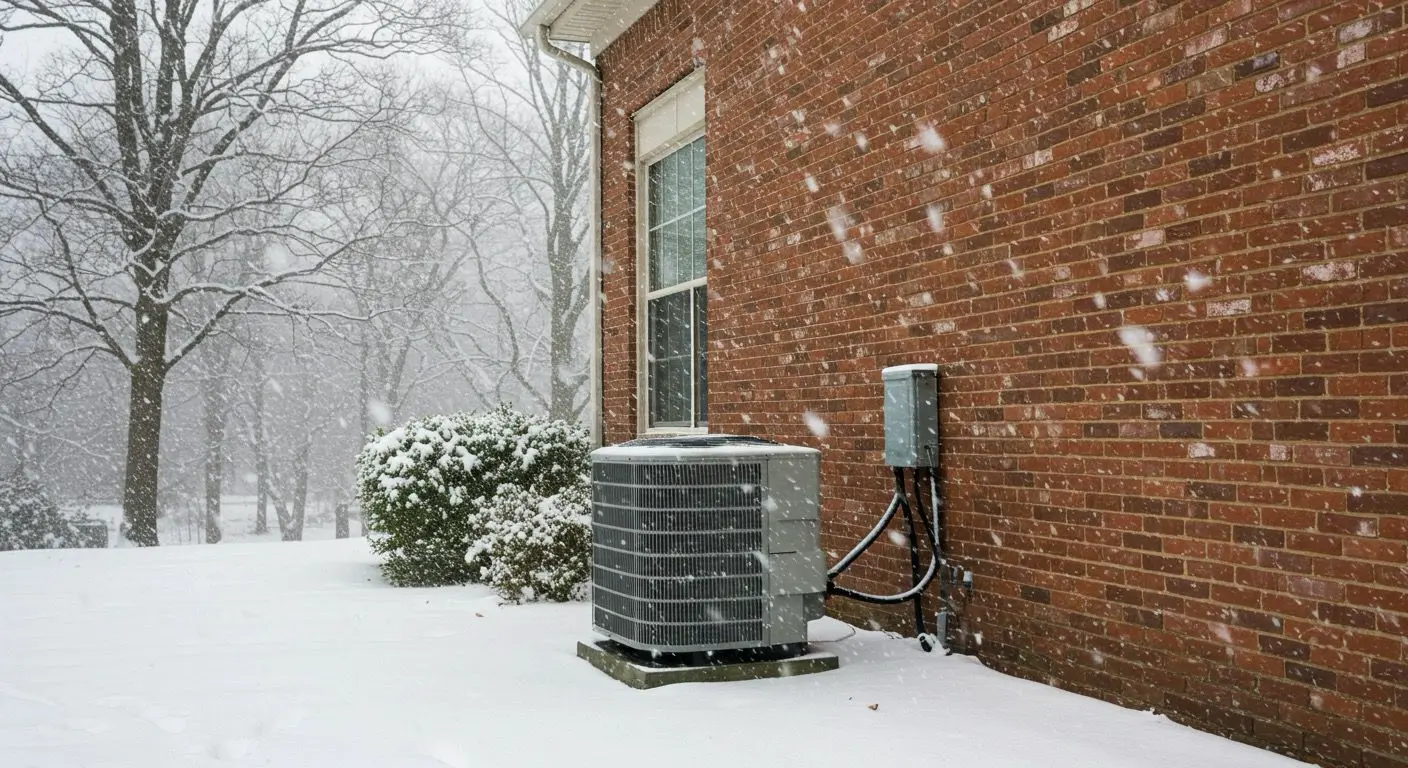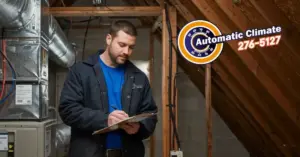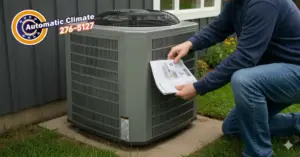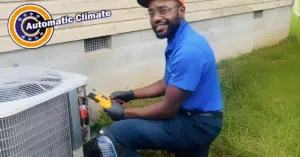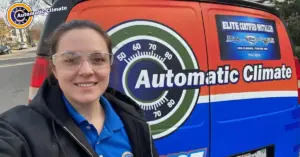Why Does My HVAC System Trip the Circuit Breaker?
Written by Cole Summers at Automatic Climate in Richmond, Virginia.
It’s a sweltering Richmond summer day, or perhaps a chilly winter evening, and suddenly… silence. The comforting hum of your HVAC system cuts out, and you’re left wondering what went wrong. A quick check reveals the likely culprit: a tripped circuit breaker. Experiencing an HVAC system trips circuit breaker scenario is more than just an inconvenience; it can be a sign of underlying issues that need attention. Why does this happen, and what can you do about it? Don’t worry, we’re here to shed some light on this common household problem.
Understanding why your HVAC system trips circuit breaker repeatedly is crucial. While a one-off trip might be due to a temporary power surge, consistent tripping points to a more persistent problem within your heating, ventilation, and air conditioning system or the electrical circuit it relies on. Ignoring it isn’t just uncomfortable; it could lead to more significant damage or even safety hazards. Let’s dive into the common reasons behind this frustrating issue and explore potential solutions.
Common Culprits: Why Your HVAC Keeps Tripping the Breaker
Circuit breakers are safety devices. Their job is to interrupt the flow of electricity when they detect an overload or fault, preventing overheating wires and potential fires. When your HVAC system trips circuit breaker, it’s doing its job because the system is drawing more electrical current (amps) than the circuit is designed to handle safely. Several factors can cause this excessive power draw.
1. Restricted Airflow: The Usual Suspect
One of the most frequent reasons an HVAC system trips circuit breaker is restricted airflow. Your HVAC system needs to breathe freely to operate efficiently. When airflow is blocked, components like the blower motor have to work much harder and longer to circulate air throughout your home. This increased effort demands more electricity, potentially exceeding the breaker’s limit.
- Dirty Air Filter: This is often the primary offender. A clogged air filter acts like trying to breathe through a thick cloth – it severely restricts the air entering the system. The blower fan strains, overheats, draws excess current, and *click* goes the breaker. Regularly checking and changing your air filter (typically every 1-3 months, depending on the type and household conditions) is the easiest preventative measure. A link often cited for AC issues caused by filters is from reputable sources like This Old House, which highlights how a dirty air filter can cause system strain leading to a tripped breaker.
- Blocked Vents and Registers: Ensure furniture, rugs, curtains, or other objects aren’t blocking supply (where air comes out) or return (where air goes in) vents. Blocked vents create pressure imbalances and force the system to work harder, much like a dirty filter. Keep all vents clear, even in unused rooms.
- Dirty Evaporator or Condenser Coils: The coils are essential for heat exchange. Inside (evaporator) coils absorb heat from your indoor air, while outside (condenser) coils release that heat outdoors (or vice-versa in heating mode for heat pumps). If either set of coils is coated in dirt, dust, or grime, heat transfer is hampered. The system must run longer and harder to compensate, increasing energy consumption and the risk of the HVAC system trips circuit breaker. Cleaning coils, especially the outdoor unit, often requires professional service. Many sources, like Bob Vila’s site, mention dirty coils as a key reason for breaker trips.
- Leaky or Restricted Ductwork: Crushed, kinked, or leaking ducts mean conditioned air isn’t efficiently reaching its destination. Your system runs longer trying to achieve the thermostat setting, drawing more power and potentially causing the HVAC system trips circuit breaker.
Addressing airflow issues is often the first step in troubleshooting why your HVAC system trips circuit breaker. Simple maintenance like changing the filter can sometimes resolve the problem quickly and affordably. Ignoring these often leads to bigger headaches down teh road.
Our Trusted Partners
EXCELLENTTrustindex verifies that the original source of the review is Google. Aaron J. Visited our home later this evening to follow up with today’s install and the system checked out as it should. The only issue we had was connecting and setting up the wireless thermostat due to the app issues. He was very professional and patient. John and Joe replaced our 2nd floor gas heating system in a professional manner. Everything went smooth according to them and they finished the job in less time than expected. Aaron was professional and extremely thorough during his visit to our home. He took the time to explain the workings of our HVAC system and answered every question. To add to the above, I called the office and spoke with both Austin and Jason who were also very helpful while explaining the warranty and transfer of same. We are extremely pleased with Automatic Climate and will highly recommend to anyone who may ask for recommendations.
Owner's reply
Thank you for sharing your positive experience! We're thrilled Aaron, Austin, and Jason could assist you so thoroughly. Your recommendation means a lot, and we're glad we could help with your HVAC system and warranty details.Posted onTrustindex verifies that the original source of the review is Google. I had a very positive experience with them. They had better financing options, better prices, and were more responsive than other companies I got quotes from. Michael Chris and the whole team were fantastic. Highly recommendPosted onTrustindex verifies that the original source of the review is Google. Technician was on time, personable and professional. He throughly explained everything that he was going to do and identified any concerns. Very pleased with the overall experience and would recommend to other homeownersPosted onTrustindex verifies that the original source of the review is Google. I had the coils cleaned in my tankless water heater. Aaron Jernigan was so seemingly competent, so well-mannered, so good explaining what was going on, I am considering switching to Automatic Climate, I will definitely have all the vents in my house blown out in the near future.Posted onTrustindex verifies that the original source of the review is Google. Fast, friendly, knowledgeable and professional. Their associate, Casey J, helped fix our heat when we were enduring 20-30 degree nights. Thank you so much!!Posted onTrustindex verifies that the original source of the review is Google. Charlie was very dedicated. Provided excellent service. Very impressed with his dedication. Did check on HVAC and cleaned drier vent in Condo we purchased last summer.Posted onTrustindex verifies that the original source of the review is Google. I've been a customer of Automatic Climate for several years. I value the services of this firm. My commitment to renewing my maintenance contract year after year is directly related to the technical expertise of one of the company’s many representatives, Antonio Diaz. Antonio has kept all three of my units running smoothly for years, and when necessary forewarns me early of any pending issues. He offers solutions right away without long waits for follow up. I've never had to call the company back to correct any of his work. Antonio attributes his success and extraordinary customer service to the culture of Automatic Climate. I would recommend Antonio and Automatic Climate to any of my friends and neighbors. They're a company you can trust.
Owner's reply
Thank you so much for your kind words! We're thrilled to hear you had a positive experience with our service.Posted onTrustindex verifies that the original source of the review is Google. John & Nick were here today to clean our air ducts. They were very thorough and made sure that they left our home as clean as when they arrived. They explained the process clearly and worked efficiently. Great job!Verified by TrustindexTrustindex verified badge is the Universal Symbol of Trust. Only the greatest companies can get the verified badge who has a review score above 4.5, based on customer reviews over the past 12 months. Read more
2. Electrical Faults within the HVAC System
Beyond airflow, various electrical components within the HVAC unit itself can fail or malfunction, causing excessive current draw and leading to the HVAC system trips circuit breaker scenario. These issues usually require professional diagnosis and repair.
- Faulty Capacitors: Capacitors are like batteries that provide the extra boost needed to start the system’s motors (compressor, fans). Start capacitors help get things moving, while run capacitors keep them running smoothly. If a capacitor is weak or fails, the motor may struggle to start or run efficiently, drawing excessive amps and tripping the breaker. Humming noises or difficulty starting are common signs. Issues related to capacitor problems are frequently discussed by manufacturers like Carrier as a cause for breaker trips.
- Worn-Out Contactors: A contactor is an electrical switch that controls the flow of power to major components like the compressor and condenser fan motor. If the contactor becomes pitted, burnt, or stuck, it can cause electrical issues leading to a tripped breaker.
- Motor Problems (Blower or Condenser Fan): The motors themselves can develop issues. Bearings can seize, windings can short-circuit, or the motor might just be old and inefficient. A struggling motor draws significantly more power, making it a common reason why an HVAC system trips circuit breaker.
- Compressor Issues: The compressor is the heart of your air conditioning (or heat pump) system. It circulates the refrigerant. Compressors require a lot of power, especially on startup. An aging compressor might struggle to start (hard starting), drawing excessive current. In more severe cases, the compressor motor windings can develop a short circuit to the metal casing (ground fault) or between windings (short circuit). These situations cause a massive surge in current, instantly tripping the breaker. Compressor issues, as detailed by sources like Family Handyman, are a serious cause for concern.
- Wiring Problems: Over time, internal wiring connections can become loose, corroded, or damaged (sometimes by pests). This can lead to short circuits or ground faults, both of which cause a sudden, large current draw that trips the breaker immediately.
Electrical faults often require a trained technician to diagnose accurately using specialized tools. Attempting DIY electrical repairs on an HVAC system is generally not recommended due to safety risks. If you suspect an electrical issue is causing your HVAC system trips circuit breaker problem, calling a professional like Automatic Climate is the safest course of action.
SKip The Line! Schedule Your HVAC Service by Booking Online Now.
Get in Touch
Contact Us
3. Problems with the Circuit Breaker or Electrical Panel
Sometimes, the issue isn’t with the HVAC unit itself, but with the breaker or the electrical panel supplying the power.
- Weak or Faulty Breaker: Circuit breakers don’t last forever. They can weaken over time and start tripping at lower current levels than they are rated for, or simply fail internally. If the breaker feels hot to the touch (use extreme caution!) or looks discolored, it might need replacement by a qualified electrician.
- Loose Connections at the Panel: The wires connecting to the circuit breaker in the panel can become loose over time due to vibrations or thermal expansion/contraction. A loose connection creates resistance, which generates heat and can lead to the breaker tripping or even melting. This requires tightening by an electrician.
- Undersized Circuit or Breaker: If a new, more powerful HVAC system was installed without upgrading the corresponding circuit wiring or breaker size, the existing setup might be inadequate. The system’s normal operating current could be too close to, or exceed, the breaker’s rating, causing frequent trips. This is why correct installation and matching components is vital.
- Shared Circuit (Less Common for HVAC): While dedicated circuits are standard for HVAC systems, in some older homes, the furnace or air handler might share a circuit with other outlets or appliances. Running the HVAC simultaneously with another high-draw device on the same circuit could overload it.
Issues within the electrical panel absolutely necessitate professional help from a licensed electrician. Working inside a breaker box is dangerous if you’re not trained. If your HVAC system trips circuit breaker and you suspect the panel, don’t hesitate to call for expert assistance.
4. Low Refrigerant Levels
While it might seem counterintuitive, low refrigerant doesn’t directly cause a breaker trip due to *high* current. However, it makes the system work much harder and less efficiently to cool your home. The system runs constantly, components can overheat from the extended operation, and this *indirectly* leads to increased stress and potentially higher current draw over time, contributing to why your HVAC system trips circuit breaker. Low refrigerant is usually caused by a leak, which needs professional repair and recharging. The Department of Energy mentions refrigerant issues as a common AC problem affecting performance.
So, as you can see, the reasons behind an HVAC system trips circuit breaker situation are varied, ranging from simple maintenance oversights to complex electrical failures. It’s important not to just keep resetting the breaker without investigating the cause.
“The best way to predict the future is to create it.” – Peter Drucker
Taking proactive steps and understanding potential HVAC issues helps create a future with reliable home comfort.
Info Chart: Common Causes of HVAC Breaker Trips
Airflow Issues
- Problem: Dirty Air Filter
- Symptom: Reduced cooling/heating, system runs longer.
- Impact: Blower motor strains, overheats, draws excess amps.
- Source: This Old House
Airflow Issues
- Problem: Dirty Coils (Indoor/Outdoor)
- Symptom: Poor heat exchange, system runs constantly.
- Impact: System works harder, higher energy use, potential overload.
- Source: Bob Vila
Electrical Faults
- Problem: Failing Capacitor
- Symptom: Humming noise, motor struggles to start/run.
- Impact: Motor draws excessive amps during startup/run.
- Source: Carrier
Electrical Faults
- Problem: Compressor Issues (Hard Start/Short)
- Symptom: Breaker trips instantly or after short run time.
- Impact: Very high current draw, major system fault.
- Source: Family Handyman
Breaker/Panel Issues
- Problem: Faulty Breaker / Loose Wires
- Symptom: Breaker trips frequently, feels hot, looks burnt.
- Impact: Breaker trips prematurely or connections overheat.
- Source: Requires Electrician Diagnosis (General Electrical Knowledge)
Refrigerant Issues
- Problem: Low Refrigerant (Leak)
- Symptom: Poor cooling, system runs constantly, possible icing.
- Impact: Indirectly causes overheating and strain over time.
- Source: Dept. of Energy
This chart provides a quick overview. Remember, multiple issues can occur simultaneously. Persistent HVAC system trips circuit breaker problems warrant professional investigation.
Troubleshooting Steps You Can Take (Safely!)
While many causes require a pro, there are a few things a homeowner can safely check when their HVAC system trips circuit breaker:
- Check the Air Filter: As mentioned, this is step one. Locate your filter (usually in the return air duct or near the air handler/furnace) and inspect it. If it looks dirty or clogged, replace it with a new one of the correct size and type. This simple step solves a surprising number of issues.
- Inspect Vents and Registers: Walk around your home and ensure all supply and return vents are open and unobstructed by furniture, curtains, or anything else. Good airflow is key.
- Look at the Outdoor Unit (Condenser): Check the outdoor unit for obvious obstructions. Is it covered in leaves, grass clippings, or dirt? Is vegetation growing too close (keep about 2 feet of clearance)? While a deep clean is best left to pros, you can gently clear away loose debris from the exterior fins (after turning off power at the breaker *and* the disconnect switch near the unit). Be careful not to bend the delicate fins. If the unit seems excessively dirty, it’s a sign professional cleaning is needed and could be why the HVAC system trips circuit breaker.
- Reset the Breaker (Once): Go to your electrical panel. Find the breaker labeled “HVAC,” “AC,” “Furnace,” or “Air Handler.” It might be a double-pole breaker (two switches linked together). Flip it fully to the “OFF” position, then firmly back to the “ON” position. **Crucially:** Only do this *once*. If the breaker trips again immediately or shortly after the system starts, DO NOT keep resetting it. This indicates a persistent fault that needs professional diagnosis. Continual resetting can damage your equipment or create a fire hazard. Many guides, including those from manufacturers like Goodman, emphasize not repeatedly resetting a tripping breaker.
- Allow Cool-Down Time: Sometimes, components like the compressor might have an internal thermal overload that tripped due to overheating. After resetting the breaker, wait 15-30 minutes before turning the thermostat back on to allow components to cool down.
If these steps don’t resolve the issue and your HVAC system trips circuit breaker again, it’s time to call in the experts. Pushing the system or attempting complex repairs yourself can lead to more extensive damage or injury.
When to Call Automatic Climate (or a Qualified Pro)
You should definitely call a licensed HVAC professional like Automatic Climate if:
- The HVAC system trips circuit breaker repeatedly, especially immediately after resetting.
- You hear unusual noises like buzzing, humming, grinding, or screeching from the indoor or outdoor unit.
- You smell burning odors near the HVAC equipment or the electrical panel.
- The circuit breaker itself feels hot to the touch or shows signs of scorching/melting (call an electrician for this specifically, though an HVAC tech can often identify it).
- Your system struggles to cool or heat effectively even after checking filters and vents.
- You see ice forming on the refrigerant lines or coils.
- You suspect any kind of electrical short, capacitor issue, motor problem, or compressor failure.
- You’re simply uncomfortable or unsure about diagnosing the problem yourself. Safety first!
A qualified technician has the tools, training, and experience to safely diagnose the root cause of why your HVAC system trips circuit breaker. They can test electrical components, measure refrigerant pressures, inspect internal parts, and determine the necessary repairs. Trying to fix complex issues without proper knowledge can be dangerous and might void warranties.
Remember, the team at Automatic Climate has been serving the Richmond, VA area since 1983. We understand the local climate and the demands placed on HVAC systems here. When your HVAC system trips circuit breaker, it’s often a cry for help from the system itself, and we’re equipped to answer that call promptly and professionally.
“An ounce of prevention is worth a pound of cure.” – Benjamin Franklin
Regular HVAC maintenance can often prevent the issues that lead to breaker trips in the first place.
Maintenance Tips Chart: Preventing Breaker Trips
Regular Filter Changes
- Action: Replace filter every 1-3 months (or per manufacturer).
- Benefit: Ensures proper airflow, reduces strain on blower motor.
- Prevents: Overheating due to restricted airflow, a common cause when HVAC system trips circuit breaker.
- Resource: Automatic Climate AC Check
Keep Outdoor Unit Clear
- Action: Trim vegetation (2ft clearance), remove debris from around unit.
- Benefit: Allows efficient heat exchange at condenser coils.
- Prevents: System overheating due to poor heat dispersal.
- Resource: Automatic Climate AC Tune-Up
Check Vents & Registers
- Action: Ensure all vents are open and unobstructed.
- Benefit: Maintains balanced airflow throughout the home.
- Prevents: Increased pressure and strain on the blower motor.
- Resource: Automatic Climate Duct Cleaning
Schedule Annual Maintenance
- Action: Book professional tune-ups (Spring for AC, Fall for Furnace).
- Benefit: Catches potential issues early, cleans coils, checks electrical components.
- Prevents: Many common causes of failure and breaker trips, ensuring efficiency.
- Resource: Automatic Climate Maintenance Agreements
Proactive maintenance is the best defense against unexpected breakdowns and the frustration of an HVAC system trips circuit breaker problem.
Understanding the Severity: Why Ignoring a Tripping Breaker is Risky
It might be tempting to just keep flipping that breaker switch back on, especially if it buys you a little more heating or cooling time. However, this is strongly discouraged. The breaker is tripping for a reason – it’s detecting a dangerous condition. Constantly forcing it back on can:
- Damage HVAC Components: The underlying issue (like a struggling motor or overheating compressor) will only worsen, leading to more expensive repairs or premature system failure. What might start as a capacitor replacement could end up requiring a new compressor if ignored.
- Damage the Circuit Breaker: Repeatedly tripping under load can weaken or destroy the breaker itself, making it less effective as a safety device.
- Overheat Wiring: If the problem is drawing excessive current, forcing the circuit back on repeatedly allows wiring to overheat, potentially melting insulation and creating a serious fire hazard within your walls or electrical panel. This is precisely what the breaker is designed to prevent.
- Lead to System Failure: Ignoring the warning signs when your HVAC system trips circuit breaker can ultimately lead to a complete system breakdown, often at the most inconvenient time (like the hottest day of summer).
Think of the tripped breaker as your home’s electrical system waving a red flag. It’s signaling that something requires immediate investigation. Addressing the root cause promptly protects your equipment, your home, and your family’s safety. The fact that your HVAC system trips circuit breaker should be taken seriously.
HVAC Breaker Tripping? Don’t Sweat It!
Is your HVAC system trips circuit breaker constantly, leaving you uncomfortable and worried in Richmond, VA? Stop the frustration and protect your system!
The experienced, NATE-certified technicians at Automatic Climate can quickly diagnose the problem and provide reliable repairs. We’ve been keeping Richmond comfortable since 1983!
Or call us directly at (804) 803-1983 for prompt assistance.
Source: Automatic Climate HVAC Services
Case Study: The Repeatedly Tripping Breaker in Midlothian
The Problem:
A homeowner in Midlothian, VA, contacted Automatic Climate because their air conditioner’s circuit breaker kept tripping every 30-60 minutes during a July heatwave. They had replaced the air filter, but the issue persisted. Their main complaint was that their HVAC system trips circuit breaker far too often.
Our Diagnosis:
An Automatic Climate technician arrived and performed a thorough inspection. After ensuring the filter was indeed clean and vents were clear, the technician focused on the outdoor condenser unit. Initial checks showed the unit was drawing higher-than-normal amperage when running. Using diagnostic tools, the technician tested the run capacitor for the compressor motor. The capacitor tested significantly below its rated microfarad (µF) value, indicating it was failing.
The Solution:
The failing run capacitor wasn’t providing consistent power to the compressor motor, causing it to work harder and draw excessive current, which ultimately tripped the breaker. The technician replaced the faulty capacitor with a new, correctly rated one. After replacement, the system was run, and amperage readings were monitored. The current draw returned to normal operating levels.
The Outcome:
The air conditioner ran smoothly without tripping the breaker. The homeowner was relieved to have consistent cooling restored quickly and efficiently, preventing potential damage to the more expensive compressor motor. This case highlights how a relatively small component failure can cause the significant symptom of an HVAC system trips circuit breaker.
The Importance of Professional Diagnosis
As the case study illustrates, accurately pinpointing why an HVAC system trips circuit breaker requires expertise. While a dirty filter is a simple fix, issues like faulty capacitors, motor problems, compressor failure, or panel wiring issues demand professional tools and knowledge. Technicians can perform tests like:
- Amperage Draw Measurement: Using a clamp meter to measure the actual current being drawn by different components (blower motor, condenser fan, compressor) to see if it exceeds specifications.
- Capacitor Testing: Measuring the microfarad rating of start and run capacitors to ensure they are within tolerance.
- Megohmmeter Testing (Megger Test): Testing motor windings for shorts to ground, which cause immediate breaker trips.
- Voltage Checks: Ensuring the unit is receiving proper voltage and checking for voltage drops under load.
- Visual Inspection: Looking for burnt wires, loose connections, oil leaks (indicating refrigerant leaks), or other signs of wear and tear.
- Refrigerant Pressure Checks: Although less direct for breaker trips, checking pressures helps assess overall system health and efficiency, which can indirectly contribute to strain.
Choosing a reputable, experienced company like Automatic Climate ensures that the diagnosis is accurate and the repair addresses the true cause of the problem. We don’t just treat the symptom (the tripped breaker); we find and fix the disease causing your HVAC system trips circuit breaker.
Attempting complex electrical troubleshooting or repairs without proper training is not only potentially ineffective but also carries significant risks of electrical shock or causing further damage to your expensive HVAC system. Your safety and the reliable operation of your system are paramount. The repeated instance of an HVAC system trips circuit breaker is a clear sign that professional help is warranted.
Consider the complexity. Your HVAC system combines high-voltage electricity, intricate mechanical parts, refrigerant under pressure, and sometimes natural gas. It’s not a simple appliance. When the safety mechanism like the circuit breaker activates repeatedly because the HVAC system trips circuit breaker, it’s protecting you from potential harm related to these complex interactions.
Long-Term Considerations: System Age and Efficiency
Sometimes, an older HVAC system may start tripping the breaker more frequently simply due to age and wear. Components become less efficient, motors work harder, and the likelihood of electrical issues increases. If your system is over 10-15 years old and experiencing frequent problems like the HVAC system trips circuit breaker, it might be nearing the end of its reliable service life.
In such cases, while a repair might fix the immediate issue, it could be a temporary patch. You might face a series of repairs as different aging components fail. An Automatic Climate technician can assess the overall condition of your older system and provide honest advice on whether repair or replacement is the more cost-effective solution in the long run.
Upgrading to a newer, high-efficiency system can offer benefits beyond just solving the breaker problem, including lower energy bills, improved comfort and air quality, quieter operation, and enhanced reliability. It’s an investment in your home’s comfort and value. If your current HVAC system trips circuit breaker regularly, discussing replacement options might be a worthwhile conversation.
Frequently Asked Questions (FAQ)
1. Why did my AC breaker trip for the first time?
A single trip could be due to a temporary power surge (like from a storm), or it might be the first sign of an emerging issue like a dirty filter or slightly overworked component. Reset it once, but monitor the system. If it happens again, investigate further.
2. Is it dangerous if my HVAC system trips circuit breaker?
Yes, potentially. The breaker is tripping because of an overload or fault. Repeatedly resetting it bypasses this safety feature and can lead to component damage, wiring overheating, and fire hazards. Address the underlying cause.
3. How often should I change my HVAC air filter?
Generally, every 1-3 months for standard 1-inch filters. Higher quality pleated filters might last longer (3-6 months). Check monthly and replace when visibly dirty. Households with pets or allergies may need more frequent changes. Source: Filter info.
4. Can a dirty outside unit cause the breaker to trip?
Yes. Dirt and debris on the condenser coils prevent the system from releasing heat efficiently. This forces the system to work harder and longer, drawing more power and potentially causing the HVAC system trips circuit breaker.
5. What does a capacitor do in an HVAC system?
Capacitors store electrical energy and release it to help start (start capacitor) and run (run capacitor) the system’s motors (compressor, fans). A failing capacitor is a common reason an HVAC system trips circuit breaker.
6. Could the problem be my thermostat?
Usually, a faulty thermostat causes the system not to turn on/off correctly, rather than directly tripping the breaker. However, faulty wiring *to* the thermostat could potentially cause a short circuit. But typically, the thermostat itself isn’t the cause when the HVAC system trips circuit breaker.
7. How much does it cost to fix a tripping breaker issue?
Costs vary widely depending on the cause. Replacing an air filter is inexpensive. Replacing a capacitor might be a few hundred dollars. Replacing a faulty breaker is similar. However, replacing a compressor or dealing with major electrical shorts can be significantly more expensive. Accurate diagnosis is key. Automatic Climate avoids mentioning specific prices until diagnosis.
8. Can I replace the circuit breaker myself?
It is strongly recommended *not* to work inside your electrical panel unless you are a qualified electrician. There’s a serious risk of electric shock. If you suspect the breaker itself, call an electrician.
9. Does a tripping breaker mean I need a new HVAC system?
Not necessarily. It could be a simple issue like a dirty filter or a failing capacitor. However, if the system is old (15+ years) and the issue is major (like compressor failure), replacement might be more economical than repair.
10. What is a “hard start kit”?
It’s an additional capacitor (and sometimes a potential relay) added to help an aging compressor start more easily, reducing the high current draw during startup that can cause an HVAC system trips circuit breaker situation. It can sometimes prolong the life of an older unit but isn’t a guaranteed fix. Source: Mentioned in Bob Vila article.
11. Can low refrigerant cause a breaker trip?
Indirectly. Low refrigerant makes the system run inefficiently and constantly, leading to overheating and strain, which *can* eventually cause components to draw excessive current and trip the breaker. The primary symptom is poor cooling, though.
12. Why does my furnace trip the breaker in winter?
Similar reasons as AC: dirty filter restricting airflow, failing blower motor, electrical shorts in the furnace wiring or components, or issues with the breaker/panel itself. Even gas furnaces need electricity for fans and controls. Source: Trane Furnace Article.
13. What’s the difference between a short circuit and an overload?
An overload is when the system draws more current than the circuit is rated for, usually due to working too hard (dirty filter, coils). A short circuit is when a hot wire touches a neutral or ground wire, causing a sudden, massive surge of current. Both will cause the HVAC system trips circuit breaker, but shorts usually trip it instantly.
14. Can power surges cause my breaker to trip?
Yes, external power surges from the grid or lightning can sometimes cause breakers to trip as a protective measure. If it happens once during a storm and doesn’t repeat, this might be the cause. Consider surge protection for valuable appliances like HVAC systems.
15. Should I turn off my HVAC at the thermostat before resetting the breaker?
Yes, it’s a good practice. Turn the thermostat to the “Off” position before resetting the breaker. Then, after flipping the breaker back on, wait a few minutes before turning the thermostat back to “Cool” or “Heat”.
16. What is NATE certification for HVAC technicians?
NATE (North American Technician Excellence) is an independent certification organization for HVACR technicians. NATE-certified techs have passed rigorous, knowledge-based exams demonstrating real-world expertise. Choosing a company like Automatic Climate with NATE-certified techs ensures a high level of competence. Source: About Automatic Climate.
17. Will annual maintenance prevent breaker trips?
It significantly reduces the risk. Maintenance includes cleaning coils, checking electrical connections, testing capacitors, lubricating motors, and changing filters – addressing many common causes before they lead to an HVAC system trips circuit breaker incident.
18. Could my AC unit be too large or too small for my house?
An undersized unit runs constantly, potentially overheating and tripping the breaker. An oversized unit might short-cycle (turn on/off frequently), which can strain components like capacitors and the compressor over time, eventually contributing to problems. Proper sizing is important.
19. What if the breaker trips immediately when I turn the AC on?
This usually indicates a severe electrical fault, most likely a dead short circuit in the wiring, compressor, or motor. Do *not* attempt to reset it again. Call for professional service immediately, as this is a potentially dangerous situation.
20. Who do I call first: an HVAC tech or an electrician?
If the breaker trips only when the HVAC system runs, start with a qualified HVAC technician like Automatic Climate. They can diagnose issues within the unit itself. If they suspect the problem lies within the panel or house wiring (not the HVAC unit), they will recommend calling an electrician. If multiple different circuits are tripping, start with an electrician.
Conclusion: Don’t Ignore the Warning Signs
An HVAC system trips circuit breaker scenario is more than just a temporary loss of comfort; it’s a critical warning sign from your home’s electrical system. While simple fixes like changing an air filter can sometimes resolve the issue, persistent tripping often points to more serious underlying problems that require professional attention.
Remember the common culprits: restricted airflow (dirty air filter, dirty coils, blocked vents), electrical faults within the unit (capacitor problems, motor issues, compressor issues), or problems with the breaker or panel itself. Never repeatedly reset a tripping breaker, as this risks equipment damage and fire hazards.
For homeowners in Richmond, VA, and surrounding areas, Automatic Climate is here to help. With decades of experience and a commitment to reliable service, our NATE-certified technicians can accurately diagnose why your HVAC system trips circuit breaker and perform the necessary repairs safely and efficiently. Don’t wait for a small problem to become a major expense – contact us today for peace of mind and restored comfort.
Relevant External Resources:
- Department of Energy – Common Air Conditioner Problems
- Bob Vila – Solved! Why Does My Air Conditioner Keep Tripping the Circuit Breaker?
- This Old House – Why Does My Air Conditioner Keep Tripping the Breaker?
- Consumer Reports – How to Troubleshoot Common Air Conditioner Problems
- Carrier – Why Is My Air Conditioner Tripping the Circuit Breaker?
- HowStuffWorks – Why Does My Air Conditioner Keep Tripping the Circuit Breaker?
#HVAC #CircuitBreaker #HVACRepair #AirConditioning #Heating #RichmondVA #HomeMaintenance #ElectricalSafety #HVACTips #AutomaticClimate #HVACProblem #ACTroubleshooting #FurnaceRepair #EnergyEfficiency #DirtyAirFilter #CapacitorProblem #CompressorIssue
Legal Disclaimer:
This article was drafted with the assistance of a Large Language Model, specifically Gemini, which was used for initial drafting and article outlining. The content was subsequently reviewed, edited, and fact-checked by a human writer to ensure accuracy, clarity, and adherence to editorial standards. While AI assists in the creation of this content, the human author(s) retain editorial control and full responsibility for the final content, including its accuracy and integrity. Readers should be aware that AI-generated content may present limitations, and the information provided should be considered with this in mind.
The information provided in this article is for general informational purposes only. While we strive to keep the information up-to-date and correct, we make no representations or warranties of any kind, express or implied, about the completeness, accuracy, reliability, suitability, or availability with respect to the 1 article or the information, products, services, or related graphics contained in the article for any purpose. Any reliance you place on such information is therefore strictly at your own risk. 2 HVAC systems involve electrical components, refrigerant, and potentially natural gas; attempting repairs without proper training and safety precautions can result in injury, property damage, or voiding warranties. Always consult with a qualified and licensed HVAC professional, like those at Automatic Climate (https://www.automaticclimate.com/, (804) 803-1983), for diagnosis and repair of HVAC issues.
Frequently Asked Questions
Get Expert Help Now
Our Trusted Partners
EXCELLENTTrustindex verifies that the original source of the review is Google. Aaron J. Visited our home later this evening to follow up with today’s install and the system checked out as it should. The only issue we had was connecting and setting up the wireless thermostat due to the app issues. He was very professional and patient. John and Joe replaced our 2nd floor gas heating system in a professional manner. Everything went smooth according to them and they finished the job in less time than expected. Aaron was professional and extremely thorough during his visit to our home. He took the time to explain the workings of our HVAC system and answered every question. To add to the above, I called the office and spoke with both Austin and Jason who were also very helpful while explaining the warranty and transfer of same. We are extremely pleased with Automatic Climate and will highly recommend to anyone who may ask for recommendations.
Owner's reply
Thank you for sharing your positive experience! We're thrilled Aaron, Austin, and Jason could assist you so thoroughly. Your recommendation means a lot, and we're glad we could help with your HVAC system and warranty details.Posted onTrustindex verifies that the original source of the review is Google. I had a very positive experience with them. They had better financing options, better prices, and were more responsive than other companies I got quotes from. Michael Chris and the whole team were fantastic. Highly recommendPosted onTrustindex verifies that the original source of the review is Google. Technician was on time, personable and professional. He throughly explained everything that he was going to do and identified any concerns. Very pleased with the overall experience and would recommend to other homeownersPosted onTrustindex verifies that the original source of the review is Google. I had the coils cleaned in my tankless water heater. Aaron Jernigan was so seemingly competent, so well-mannered, so good explaining what was going on, I am considering switching to Automatic Climate, I will definitely have all the vents in my house blown out in the near future.Posted onTrustindex verifies that the original source of the review is Google. Fast, friendly, knowledgeable and professional. Their associate, Casey J, helped fix our heat when we were enduring 20-30 degree nights. Thank you so much!!Posted onTrustindex verifies that the original source of the review is Google. Charlie was very dedicated. Provided excellent service. Very impressed with his dedication. Did check on HVAC and cleaned drier vent in Condo we purchased last summer.Posted onTrustindex verifies that the original source of the review is Google. I've been a customer of Automatic Climate for several years. I value the services of this firm. My commitment to renewing my maintenance contract year after year is directly related to the technical expertise of one of the company’s many representatives, Antonio Diaz. Antonio has kept all three of my units running smoothly for years, and when necessary forewarns me early of any pending issues. He offers solutions right away without long waits for follow up. I've never had to call the company back to correct any of his work. Antonio attributes his success and extraordinary customer service to the culture of Automatic Climate. I would recommend Antonio and Automatic Climate to any of my friends and neighbors. They're a company you can trust.
Owner's reply
Thank you so much for your kind words! We're thrilled to hear you had a positive experience with our service.Posted onTrustindex verifies that the original source of the review is Google. John & Nick were here today to clean our air ducts. They were very thorough and made sure that they left our home as clean as when they arrived. They explained the process clearly and worked efficiently. Great job!Verified by TrustindexTrustindex verified badge is the Universal Symbol of Trust. Only the greatest companies can get the verified badge who has a review score above 4.5, based on customer reviews over the past 12 months. Read more
